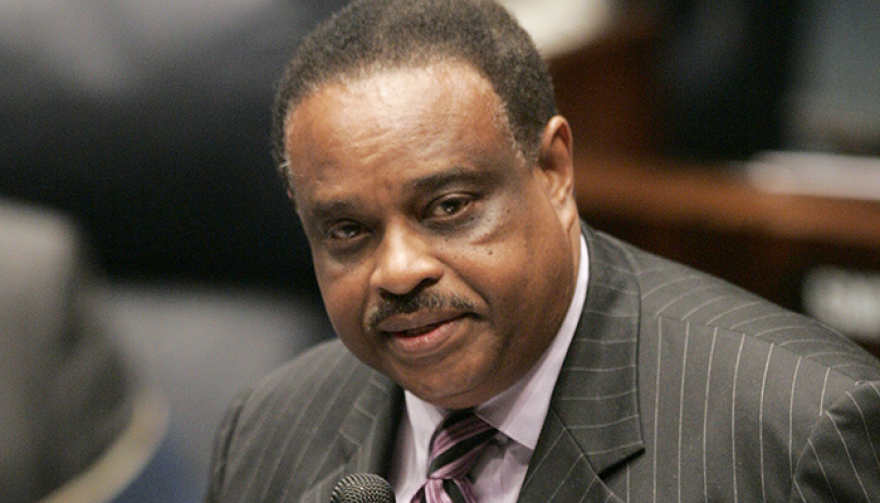In 2017, U.S. Rep. Al Lawson became the Panhandle’s first African American sworn into Congress.
“It’s not about me,” said Lawson, speaking at a voting rights rally from the steps of the old Florida State Capitol building last week. Lawson represents the 5th Congressional District, which includes part of Leon County. “It’s about those who come behind me and have the opportunity to represent minority interests.”
Five years later, a redistricting debate over whether lawmakers should carve up Lawson’s district has emerged. Gov. Ron DeSantis has doubled down on his vow to veto any map that keeps the district — where African American voters make up 44% of the constituency — mostly intact. The simple majority that Black voters have in the district gives them enough power to elect a candidate of their choice.
“We will not be signing any congressional map that has an unconstitutional gerrymander,” DeSantis said at a press conference earlier this month. “That is going to be the position that we stick to.”
In 2015, the state Supreme Court cited the district — which stretches from Gadsden County to the eastern Duval County — as a better alternative for a minority access district in north Florida than former Rep. Corrine Brown's district. Brown's district picked up Black voters in Jacksonville and meandered south to Orlando. The court ruled that was an unconstitutional gerrymander, while deciding the lines that created Lawson's district was not.
DeSantis’ map — which would give Republicans a 20-8 favorable seat advantage — would make it almost impossible for Democrats to win anywhere in north Florida.
There’s no guarantee that DeSantis’ proposed districts will become law, even though the governor has threatened to veto the legislature’s map if it keeps the 5th Congressional District intact. If DeSantis vetos it, the legislature could override his veto with a two-thirds majority or state lawmakers could refuse to act, leaving it to the state Supreme Court to ultimately decide how the map is drawn.
“I'm originally from Gadsden County,” Lawson said in an interview with WFSU News. “I’m sure that they want to vote for someone from Gadsden County.”
Gadsden County is the only county in the state that has a majority African American population.
DeSantis’ proposed plan would enlarge the state’s 2nd Congressional District — currently represented by Republican Rep. Neal Dunn of Panama City. The proposed configuration would stretch it from eastern Walton County to Madison and Taylor Counties. If the governor’s plan were to become law, then the district would cover solidly red Bay County and all of Leon County. Right now, Leon County is split between the Lawson’s and Dunn’s districts.
DeSantis’ drawing of the 2nd Congressional district looks a lot like the district’s lines prior to 2015. But back then, Democrats had a shot at winning a congressional race.
“Today, this is a district that is Trump plus eleven,” said Matthew Isbell an independent redistricting data analyst, referencing the governor’s map. “With every single cycle in north Florida, it becomes less rural Democratic friendly because more and more of those old school Democrats are either just moving steadfast GOP all the way down ballot or a lot of the older generation is just dying.”
Former Congresswoman Gwen Graham is the last Democrat to represent the 2nd Congressional District. Graham chose not to seek reelection after the district’s lines were redrawn in 2015 and the 5th Congressional District’s current configuration emerged.
In the years since Graham left office, more Democratic voters in rural counties like Jackson and Liberty have switched to the Republican Party, Isbell said. “In these small rural communities it can happen so quick,” he said. “Basically everyone starts clamoring for it. Suddenly somebody decides they're going to run as a Republican for tax collector or county commissioner or sheriff. And suddenly another person files and suddenly you have a Republican primary for the first time in that area in like, you know, a hundred years. And then a bunch of voters decide we’re going to switch.”
DeSantis’ proposed map would give Republicans an advantage in every single district across north Florida. And not one would give minority voters a large enough share of the constituency to elect a candidate of their choice, even though the state constitution’s Fair Districts Amendments bars lawmakers from drawing a map that diminishes minority voting power.
“Having an African American member of congress in North Florida is highly appropriate based on the incredibly high African American populations going back to the 1860s,” said Jon Ausman, who advocated for lawmakers to draw a minority access district in the region. “There was an extremely large slave population throughout the entire northern tier of Florida.”
Ausman, a long-time member of the Democratic National Committee, drew a congressional map that included a very similar configuration to the 5th Congressional District. He called it the “barbell district” because the western end picked up Black voters in Gadsden and Leon Counties at the eastern end and in Duval County on the district’s western end. The district leans Democratic.
“From a Democratic perspective, we could have done a lot better statewide, but I was happy with Fifth Congressional District.”


